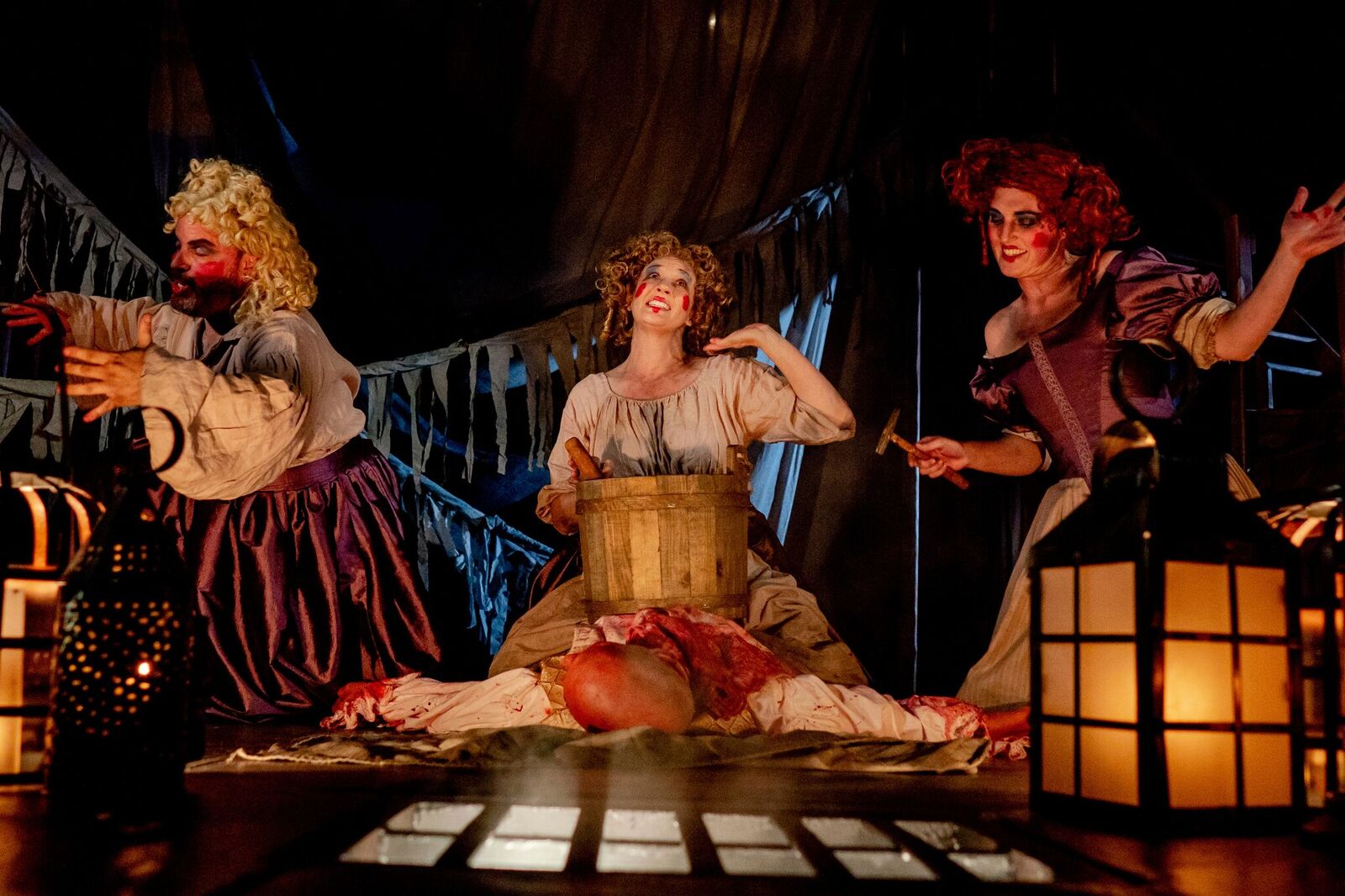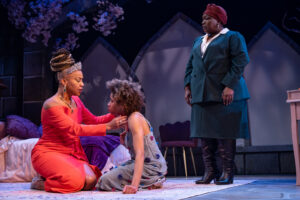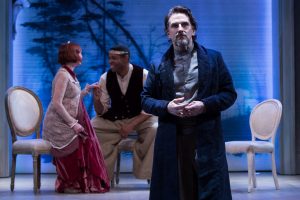The Folger Shakespeare Library is currently putting on a production of Macbeth, but not in the way that you may think. In this version, Macbeth is a musical, complete with singing and dancing witches. As adapted and amended in the 17th century by Sir William Davenant, this Restoration-era musical is not to be missed. The musical twist brings a welcome depth to the “double, double” muses. Alongside them, director Robert Richmond alters the villainous nature of Lady Macbeth to reveal a complicated soul who has bitten off more than she can chew, a change which brings new light to Macbeth’s traditional antagonist. Each cast member delivers a memorable performance, bringing to the stage a confidence that comes with their collective years of experience playing Shakespeare’s age-old characters. Macbeth impresses with effortlessly active staging, powerful monologues, and a timeless story.
During the English Civil War in 1642, Parliament closed all playhouses, not to be reopened until 1660. In this intermediary time, many things in England had changed, not the least of which, artistic tastes. When the playhouses reopened, women were allowed to perform in public, indoor theaters which were better equipped with machines and mobile sets to make for more immersive performances. Music and dance were also much more popularly demanded. Converse to the physical developments of theater, however, few new plays had been written and popularized during the playhouse closure. Classics like Shakespeare plays were popular once more, though were in need of modification to fit current fashion. In response to the call, Sir William Davenant reimagined Macbeth with dancing and singing, a revisioned version that proved a huge hit.
The revisionist-era play’s popularity proves warranted on the Folger stage. As the witches sing and dance their way through the events of the tragic and troubled tale of Macbeth, viewers find themselves haunted by their voices, and more aware of their significance to the story as a whole. The talented soprano Emily Noël, playing a witch, mystifies the characters with whom she interacts as well as the audience, with her crystal high notes that highlight the innocence of her character. She is accompanied by the equally talented Rachael Montgomery, who brings a sinicism to her performance that sets her character apart from her sisters as the true villain of the group. Ethan Watermeier as the final, dim-witted “sister” adds humor to each of the witches’ scenes with his deep bass notes and hilarious dopey movements.
Together, the witches manipulate and enchant the characters into believing their prophecies and following their wicked advice. During scenes when the group is alone, as in the original version of the play, they prepare brews which alter the course of the lives of the other characters, namely, Macbeth. In the traditional version of Shakespeare, the repetitive, abstract language of the witch scenes are wont to alienate viewers, but here they are made enchanting by the witches’ songs and dance.
In most performances of Macbeth, Lady Macbeth is unquestionably the antagonist. She begs God, “unsex me here” so that she may commit the evil deed of forcing her husband to murder, unhindered by excess emotion, which she believes is a uniquely female trait. In director Robert Richmond’s eyes, however, she is both a sinner and a guilty one, if not at least one deeply affected by her own choices. As the play’s events continue towards her eventual madness and death, he pauses in between her heinous crimes and ultimate fate to highlight her despair and fear. Kate Eastwood Norris fully encompasses the complicated character and manages to make her tragic, communicating her character’s anxiety in the face of her husband’s madness through a physical jumpiness and subtle gestures. This reimagination of Lady Macbeth’s role in Macbeth’s treason is a fresh perspective that invites a new investigation of the traditional villain.
The cast members bring depth to their performances, reflecting their collective experience playing Shakespeare’s characters. Most of them, including Ian Merrill Peakes, who plays Macbeth, his wife Karen Peakes, who plays Lady Macduff, and Jeff Keogh, who plays Seyton, the gatekeeper, have performed in numerous Shakespeare plays at the Folger Theater. Accordingly, they exhibit a mastered comfort on the unique, square-set stage, as well as an ability to perform to all angles of the seating area. This is especially welcome to those with partially-restricted views, as the theater is designed similarly to Shakespeare-era playhouses, with large columns that both support the structure and restrict the stage view from certain seats.
Ian Merrill Peakes gives a fantastic rendering of Macbeth’s slow descent into madness. He does not allow for Macbeth to escape as merely pitiable, highlighting his character’s aggressive tendencies through shaking rage and unexpected outbursts. Other notable performances include Chris Genebach as Macduff, who delivers his character’s soliloquy with heartbreaking realness, and Andhy Mendez as Banquo, who steals his character away from both evil and naivate to ensure that the character retains his traditional innocence.
Macbeth, like all Shakespeare plays, is dialogue-heavy, long, and features many characters that are hard to keep straight. This revisionist-era version reintroduces the play to modern viewers with song and dance and livens it along the way. The dialogue is easier to follow as it is broken up by music, and the characters are easier to separate with more stage time than the original. Supported by some thought-provoking reinterpretations and a stellar cast, Macbeth at the Folger Theater is not to be missed.







